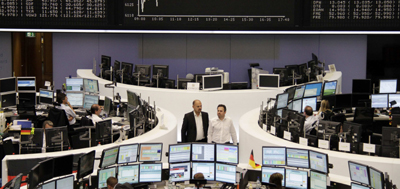Tuesday, 17 March 2015 18:50
 LONDON: The German and French stock markets slid on Tuesday, reversing strong gains won a day earlier, while the London index was steady on the eve of Britain’s budget announcement.
LONDON: The German and French stock markets slid on Tuesday, reversing strong gains won a day earlier, while the London index was steady on the eve of Britain’s budget announcement.
London’s benchmark FTSE 100 index of top companies was up 0.02 percent at 6,805.30 points around midday in the capital.
Frankfurt’s DAX 30 index slumped 1.54 percent to 11,979 points after racing above 12,000 for the first time on Monday, with traders responding to German data that missed market expectations.
Elsewhere in Tuesday trade, the CAC 40 in Paris dropped 0.83 percent to 5,018.90 points and Madrid’s IBEX 35 shed 0.98 percent to 11,005 points.
The euro climbed to $ 1.0615 from $ 1.0565 late in New York on Monday. The European single currency had started the week by falling to $ 1.0458 — the lowest level for more than 12 years.
“Given today is St Patrick’s Day there was a disappointing lack of green in the markets… as mixed news from the eurozone failed to help the DAX escape its Tuesday slump,” said Connor Campbell, analyst at Spreadex trading group.
Investor sentiment in Germany rose for the fifth consecutive month to reach a 13-month high in March, driven by positive domestic economic data, a survey found on Tuesday.
The widely watched investor confidence index calculated by the ZEW economic institute rose by 1.8 points to 54.8 points in March, its highest level since February 2014, ZEW said in a statement.
But the index fell short of analysts’ expectations for a more robust rise to 60.0 points.
“Profit-taking is weighing on the European indices… triggered by the release of the German ZEW Economic Sentiment index, which, at 54.8, came in below the expected reading,” said Forex.com analyst Fawad Razaqzada.
“In addition, the euro is a touch firmer and given the single currency’s recent negative correlation with European shares, this too is having some impact on the markets,” he added.
European stock markets had rallied Monday on optimism over the ECB’s fresh injection of stimulus across the eurozone, while the euro recovered after hitting another 12-year low versus the dollar.
Germany’s leading stock market index smashed through the psychologically important 12,000-point level, one week after the European Central Bank began its 1.14-trillion-euro ($ 1.201-trillion) bond-buying QE programme that is aimed at stimulating growth and warding off deflation in the eurozone.
Investors are meanwhile keeping their focus on the US Federal Reserve’s policy meeting Wednesday, seeking a clearer timeline for when it will raise interest rates as the world’s biggest economy strengthens.
“The euro-dollar is likely to remain range bound until after the release of the (Fed) statement on Wednesday in which the Fed is likely to drop the word ‘patient’ used to describe the eventual first interest rate hike,” said Razaqzada.
“If the Fed is no longer ‘patient’, it may increase speculation that the central bank will increase interest rates by as early as June, and cause the dollar to rally.”
Also Wednesday, Britain’s coalition government presents its final budget before a knife-edge general election, with finance minister George Osborne vowing to stick to his economic plan with “no gimmicks”.
Copyright AFP (Agence France-Presse), 2015




























